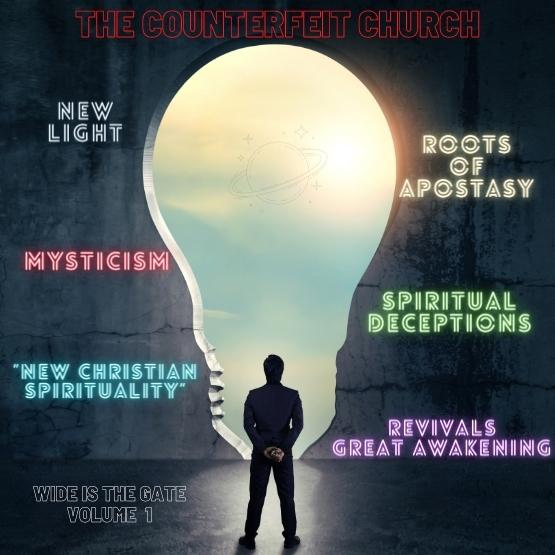Compiled by Joshua Toupos
See the historical roots and the philosophy behind the men and women who have shaped the Postmodern Churches. Once there were two Church choices, Roman Catholicism and Protestantism, but in recent decades Christianity has been redefined giving rise to unprecedented quasi-Christian spiritual philosophies and practices. Claiming to be “revivals” are these the counterfeits Jesus warned would occur before His return? (Luke 18:8)
The Awakening of the New Christian Spirituality
Wide is the Gate Volume 1 Exposes the Roots of Apostasy
Many so-called Christian leaders are introducing innovative teachings based on new Bible translations and paraphrases that alter the timeless truths of Holy Scripture. A more progressive spirituality, with roots in eastern mysticism, is replacing faith in God’s Word. This “New Christian Spirituality” poses as a more relevant “New Gospel” for today’s Postmodern culture that prefers subjective and emotional feelings, rather than absolute truths.
Biblical Truth is the foundation for knowing God. His promises and prophecies. At Pentecost, the Church was given the Holy Spirit of Truth to be guided into all Truth. Jesus Christ, Who is Truth Incarnate, taught that after His death, resurrection and ascension to Heaven, He would bring His Church to His Father’s house before returning with them to govern the world for a 1000 year Kingdom period. Biblical faith trusts God’s promise to fulfil these prophecies.
However many within the Emerging, Seeker-friendly, Purpose Driven, New Apostolic, Roman Catholic, Protestant, Reformed, neo-Evangelical, Charismatic and Pentecostal Churches deny many teachings and Prophesies in God’s Word as literal Truth.
Many promote the false gospel of transforming the world for the common good, encouraging a “working together”, and bringing about social justice on planet earth. Through modern marketing techniques and business management skills a global agenda of faith, commerce and government is being orchestrated for churches to partner with other faiths for world peace and unity. This man-made utopia will usher in the reign of Antichrist and his kingdom, preceding the coming of the True Jesus Christ and the True Kingdom of God on earth.
What is Apostasy in The Bible and Why is it Important?
Apostasy is generally defined as a falling away, a withdrawal, a defection. In Christianity, apostasy is seen as a withdrawal from faith and trust in God. Although it is not found in the English Versions of the Bible, a translation of the term is used twice in the New Testament, in the Greek original, to express abandonment of the faith.
Paul was falsely accused of teaching the Jews apostasy from Moses (Acts 21:21). He also predicted the great apostasy from Christianity, foretold by Jesus (Matthew 24:10-12) which would precede “the day of the Lord” (2 Thessalonians 2:2).
We’ve heard of recent examples of prominent authors, band leaders, and Christian philosophers leaving the faith. So let’s dive into this controversial topic and what exactly can cause apostasy in the church.
Definition of Apostasy
The Merriam-Webster definition of apostasy includes two senses of the term:
1. An act of refusing to continue to follow, obey, or recognize a religious faith
2. The abandonment of a previous loyalty: DEFECTION
Now that we have a worldly definition, let’s discuss a biblical one.
Bible Meaning of Apostasy
Before we dive into the question of whether people were believers from the start and fell away or were never believers, to begin with, we have to highlight some verses that describe the act of apostasy.
- John 6:60-66 shows many disciples leaving Jesus after they cannot digest some of his more difficult teachings. This was before the Holy Spirit indwelling in believers.
- Galatians 1:6 describes believers who are eagerly abandoning Christ and their faith.
- 1 Timothy 4:1 says many will fall away in the end times, going after the teachings of demons.
- 2 Peter 3:17 warns us to stay on guard against false teachings that can cause us to fall away from our faith.
In these verses, we learn apostasy has always been a problem within the church and will continue to be an issue into the end days. -What is Apostasy




















